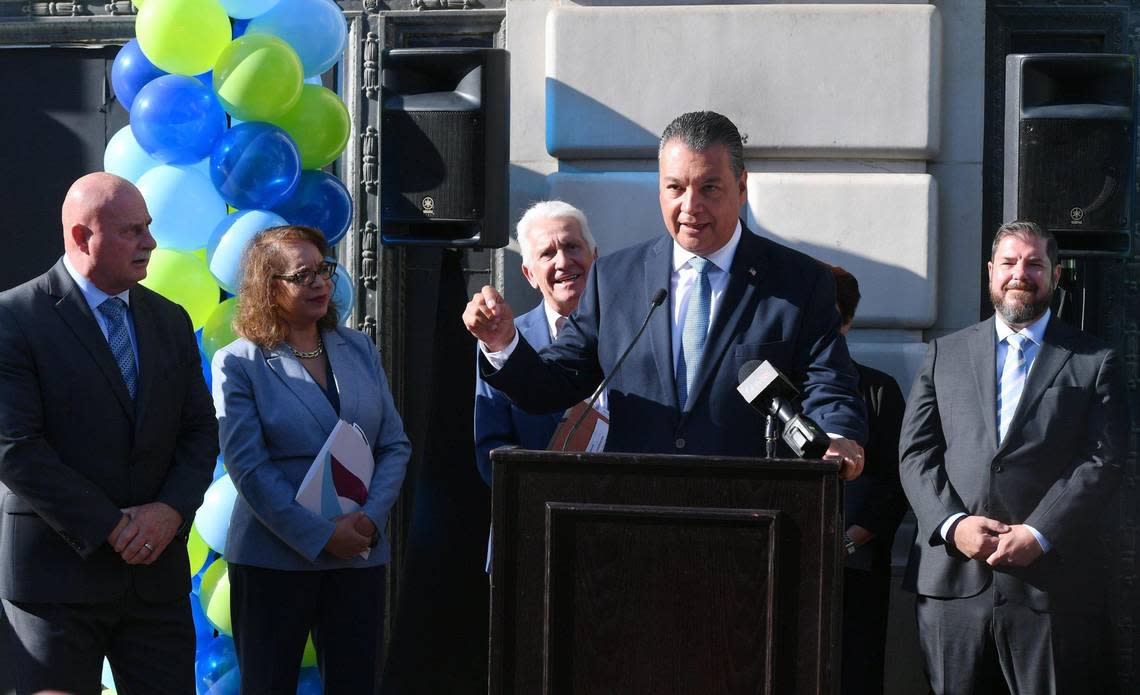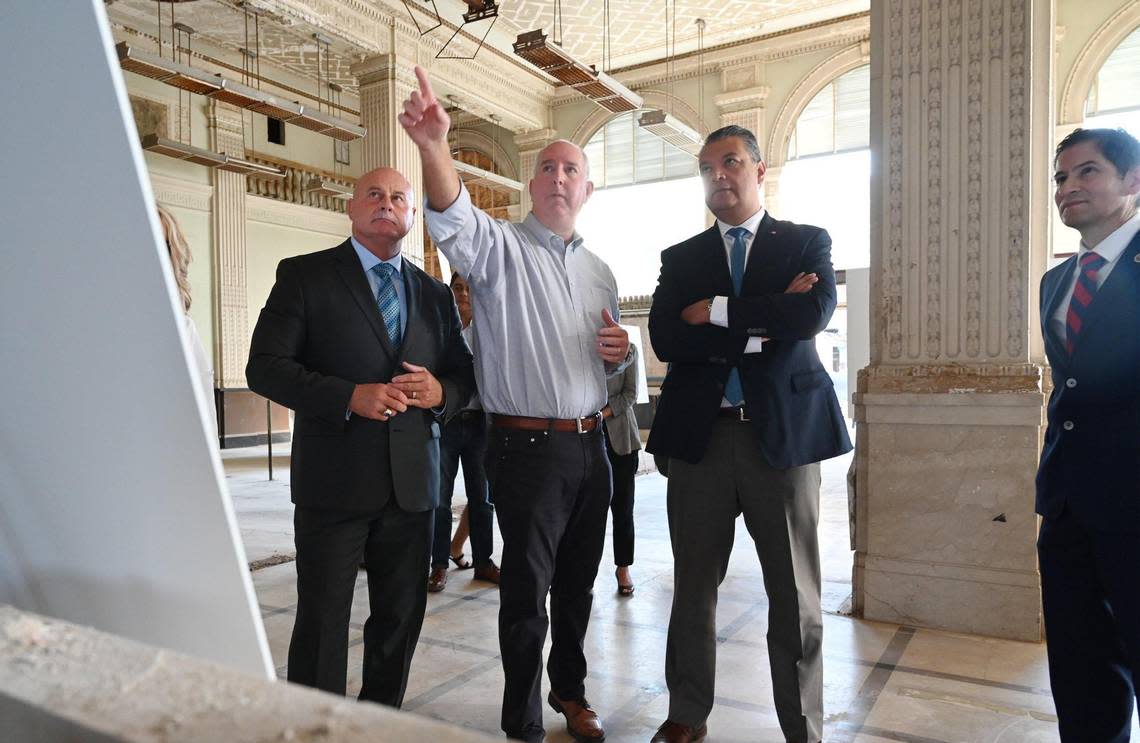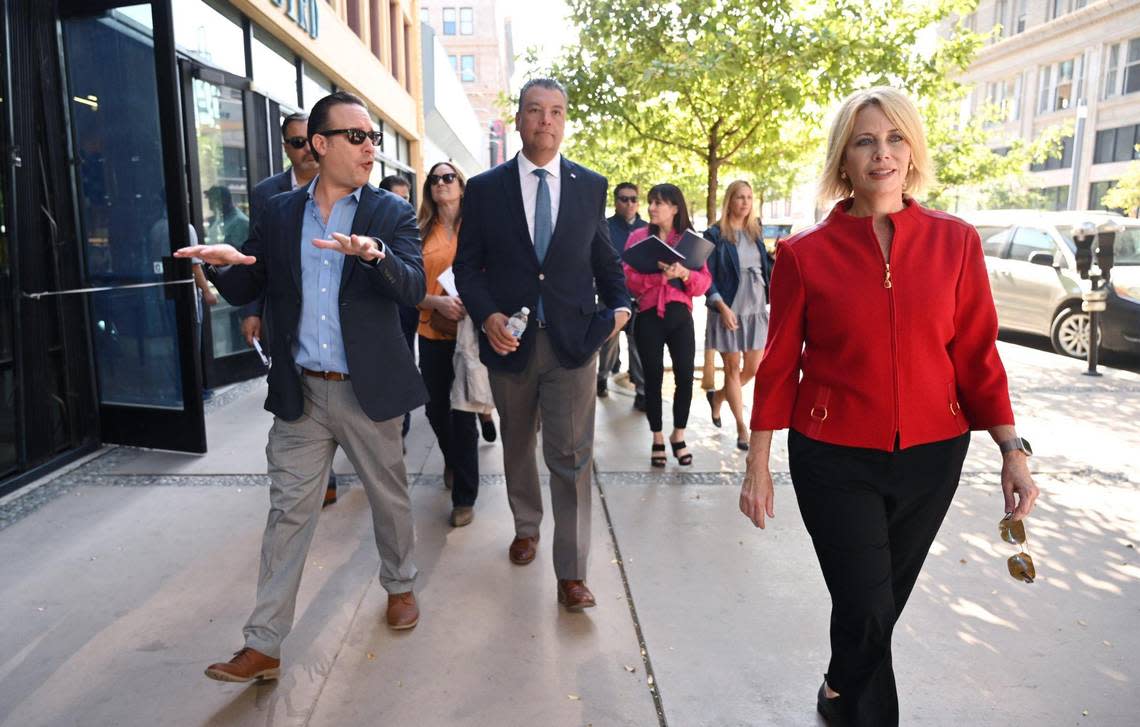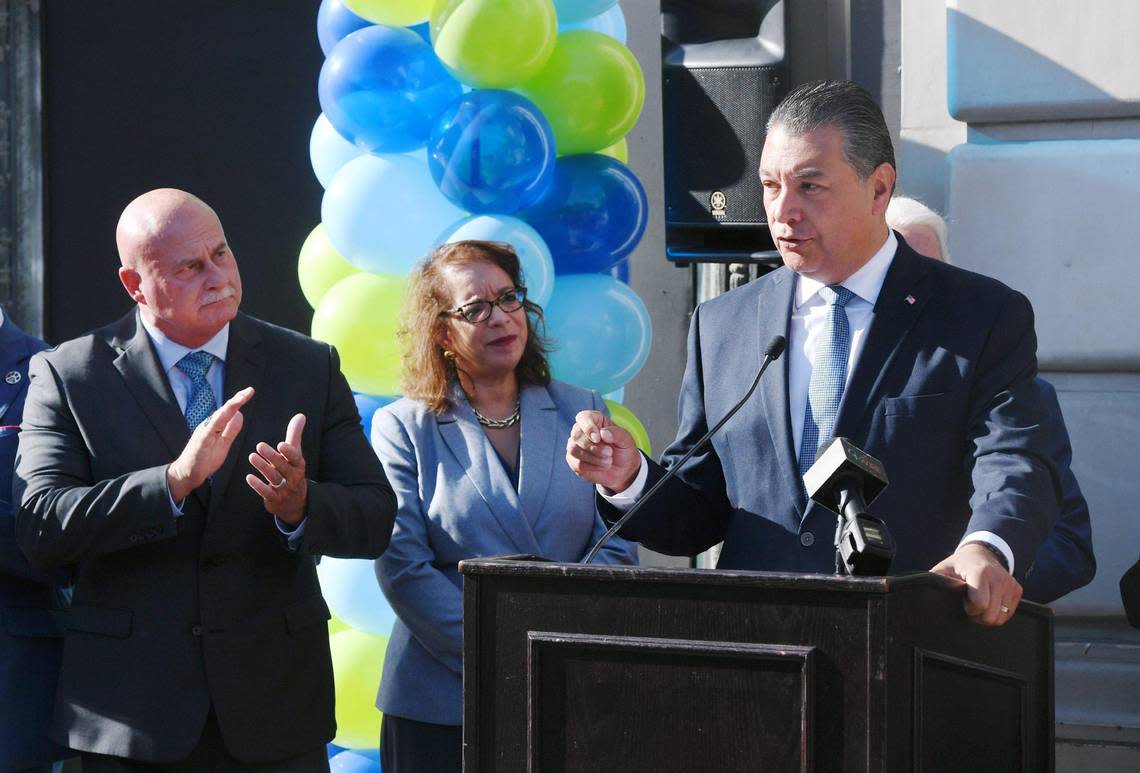Will Biden’s $65 million for Central Valley help farmworkers? Why some are ‘concerned’
As the Biden administration invests $88 million in California’s central San Joaquin Valley to create an agriculture-technology hub — and better-paying jobs — some regional labor experts are concerned the initiatives could perpetuate inequities in the region.
“When implemented wisely,” U.S. Sen. Alex Padilla, a Democrat from California, said in a media event on Friday, the funds will help create “a stronger food supply chain, a stronger, more resilient community.”
On Friday, Padilla and the U.S. Assistant Secretary of Commerce Alejandra Y. Castillo gathered with state, regional, and local leaders to celebrate the Biden administration’s recent investments – $65.1 million from the U.S. Economic Development Administration’s Build Back Better Regional Grant program and $23 million from the department’s Good Jobs Challenge.
Others in attendance included Rep. Jim Costa, a Democrat from Fresno, state Sen. Anna Caballero, Assemblymember Joaquin Arambula, a Democrat from Fresno, Fresno Mayor Jerry Dyer, and other state and local officials.
The Fresno region is the only place in the county to secure two grants from the EDA.
The Fresno-Merced Future of Food Innovation, or F3 coalition, is a regional initiative that promises to usher in a new era for the Central Valley agriculture sector with higher ag-tech and engineering-based jobs.
But introducing technology into the agriculture sector won’t automatically lead to better jobs for farmworkers, Edward Flores, a professor of sociology and faculty director of the UC Merced Community and Labor Center, said in an interview with The Bee on Thursday.
“What history has taught us is that when there isn’t a strong worker voice at the table when technology is introduced into the workplace,” said Flores, “that technology tends to make work repetitive and rote and it justifies paying workers lower wages.”
Ashley Swearengin, former mayor of Fresno, president and chief executive officer of the Central Valley Community Foundation, and leader of the F3 coalition, said she’d heard concerns about technology potentially having unintended consequences on workers and small farmers – but that the coalition is committed to equity.
Furthermore, she said introducing technology into the sector “is already happening regardless of F3.”

Farmworker expresses a mix of fear and hope for ag-tech
Alma Rosa Moreno has worked in the fields since she arrived in the U.S. in 1994.
Moreno said that she has wondered whether she’d be displaced by machines in the fields.
“We have been a little bit nervous because we see a lot of machinery coming in(to the fields),” she said through an interpreter during a roundtable discussion on Friday.
But after learning about the potential opportunities in ag-tech careers during conversations with Hernan Hernandez, executive director of the California Farmworker Foundation, Moreno said she’d “love” to be one of the people who secures a job in ag-tech.
“I know that maybe in a short time, I won’t have the same strength to be able to do hard labor,” she said, which is why she’s hopeful about less strenuous, tech-based work.
The coalition hopes to create and fill 10,000 “quality” jobs and pledges to train and upskill at least 4,200 incumbent farmworkers through its AgTEC partnership with eight local community colleges.
But this only represents a fraction of Central Valley farmworkers: roughly half of the state’s 400,000 farmworkers work and reside in the Central Valley.
According to the F3 project application, the Central Valley region remains among the most persistently poor and unequal in the U.S. “because its agriculture commodity-driven economy cannot create enough quality jobs that enable residents to make ends meet.”
This is why the coalition said it’s committed to ensuring farmworkers in the fields are the first in line for new, ag-tech jobs.

Saúl Jiménez-Sandoval, president of California State University, Fresno, said technology in the hands of farmworkers means they will do less “backbreaking” physical work.
But Flores, of UC Merced CLC, said that automating work could perpetuate inequities in the region. “Unless the design is being led by people from these communities and folks that represent them,” Flores said, “there’s going to be a concern that this falls into a longer pattern of the ways that disadvantages have existed in farm working conditions for over the past century here.”
Flores of UC Merced CLC also raised questions about who is – and isn’t – involved in the project and said it’s “critical” that the coalition engages with organizations that have expertise and trust in working with farmworkers to ensure these workers are prioritized.
F3 coalition partners include: California Farmworker Foundation, Central Valley Community Foundation, Community Alliance with Family Farmers, Cultiva La Salud, Fresno Area Hispanic Foundation, Fresno City College, Fresno Economic Development Corporation, Fresno Metro Ministry, and universities and community colleges from the region.
The Central Valley Community Foundation is a Fresnoland funder.
“Where are the organizations that have long represented workers that have long been the voice of workers that have been the experts in improving working conditions,” he asked, “where are they in relation to this initiative?”
Swearengin said the F3 coalition has engaged with community groups – and will continue to do so through its governance structure that includes “diverse” voices such as small farmers, community groups, and a range of industry partners.
“I’ve been working on economic development in the region for over 20 years and this is the first time I’ve seen all those pieces come together,” she said.

How the F3 Build Back Better $65 million will be spent
During Friday’s news conference, Costa said, ultimately, the project is about “investing in our people.”
But a closer look at the F3’s proposed budget shows the biggest allocation will go towards technological innovation and commercialization projects.
In an email statement to The Bee on Friday, a spokesperson for the Central Valley Community Foundation said that $20 million of the BBB grant would go to Fresno State and UC Merced for innovation and technology development.
The F3’s “iCREATE” program will develop an industry-academic partnership to create 100 ag-tech innovations, 40% of which will be commercialized.
According to the F3 project proposal, industry partners to be involved include agricultural associations, co-operatives, and large employers representing 15,000 farm and food enterprises with more than 430,000 employees, such as Agriland, Almond Board, Blue Diamond growers, California citrus mutual, California Fresh Fruit Association, California League of Food Processors, HMC company, Western Ag Processors, Western Growers Association, and the Wonderful Company.
Significant portions of the funds will, however, be invested into small farmers and worker retraining programs.
Over $16 million will support local farms and small business initiatives, $14.9 million will support workforce development and training programs, $12.2 million will go to the Merced College Innovation Center, and $1.9 million will be used for coordination, measurement, and evaluation efforts.
“The work starts now,” said Castillo. “We have to push that money out and into the community and make sure that the impact is felt for generations to come.”

